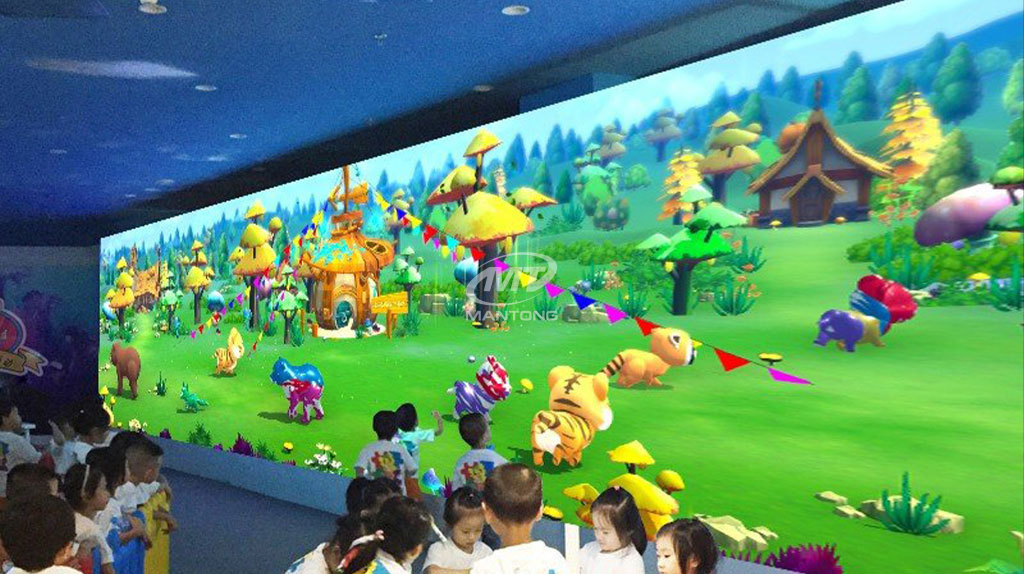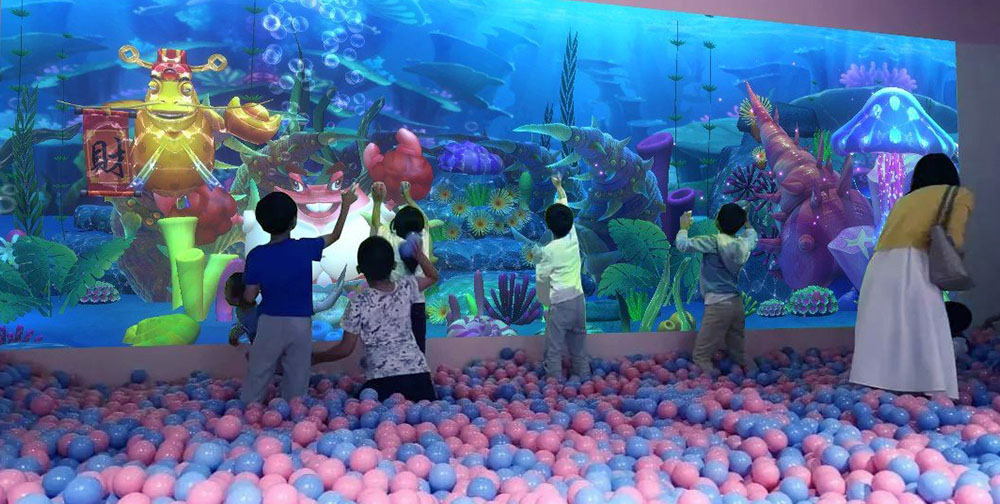Top 10 Benefits of Interactive Projector Games for Kids
Looking for a smarter alternative to passive screen time? Interactive projector games combine movement, creativity, and problem-solving—making them ideal for classrooms, play centers, and therapy rooms. Discover 10 key reasons why kids (and adults) love them.
- What Are Interactive Projector Games?
- 1. Encourages Active Movement and Physical Fitness
- 2. Enhances Cognitive and Problem-Solving Skills
- 3. Promotes Sensory Integration and Spatial Awareness
- 4. Stimulates Social Interaction and Teamwork
- 5. Makes Learning Fun and Engaging
- 6. Encourages Creative Expression and Imagination
- 7. Supports Inclusive and Adaptive Learning Environments
- 8. Reduces Reliance on Passive Screens
- 9. Easy to Install and Scalable for Different Spaces
- 10. Creates Memorable, Immersive Experiences
- Why Interactive Projector Games Are Here to Stay
In today's technology-driven world, children are growing up in a landscape filled with screens and digital content. While traditional screen time often raises concerns among parents and educators, interactive projector games are redefining how kids engage with digital play—in a healthier, more dynamic way.
Unlike passive entertainment, interactive projector systems offer immersive, movement-based experiences that promote physical activity, creativity, and cognitive growth. Whether used in classrooms, playrooms, museums, or therapy centers, these tools are revolutionizing early learning and entertainment environments.
In this article, we’ll explore the top 10 benefits of interactive projector games for kids, and why they are becoming essential tools in modern child development strategies.
What Are Interactive Projector Games?
Before diving into the benefits, it’s important to understand what interactive projector games actually are.
Unlike a standard projector that only displays static visuals, interactive projectors use motion tracking, sensors, and smart software to allow children to interact with projected content in real-time. Kids can step, wave, jump, or move objects to trigger visual and auditory feedback—turning a flat surface into an engaging play area.
Let’s now explore why this technology is transforming childhood experiences.

1. Encourages Active Movement and Physical Fitness
Unlike traditional video games or TV, interactive projector floor games get kids moving. These systems are designed to encourage gross motor activity, including jumping, running, swiping, and balancing. Games like virtual soccer, obstacle dodging, or fruit collecting get children to move with purpose.
Why This Matters
- Reduces sedentary time in classrooms and homes
- Supports physical development milestones
- Helps prevent childhood obesity
- Improves coordination and agility
Especially for young children, physical activity combined with fun stimuli can create lifelong habits for healthy living.
2. Enhances Cognitive and Problem-Solving Skills
Many interactive floor game projector systems are embedded with puzzles, memory games, math challenges, or logic tasks. Kids have to react quickly, make decisions, and process visual cues in real time.
How It Helps
- Improves reaction time and critical thinking
- Encourages logical reasoning and pattern recognition
- Supports STEM learning through gamified activities
The interplay between body movement and brain stimulation strengthens neural pathways and makes cognitive learning less abstract.

3. Promotes Sensory Integration and Spatial Awareness
For children, especially those with developmental delays or sensory processing issues, interactive projector floor games can provide multisensory stimulation. These games engage sight, sound, and kinesthetic awareness simultaneously.
Benefits for Sensory Development
- Helps improve body-space awareness
- Encourages touch-free tactile feedback
- Supports balance and visual tracking
Interactive systems often allow educators or therapists to customize environments to meet specific sensory needs—making them ideal for special education or autism-focused centers.
4. Stimulates Social Interaction and Teamwork
Unlike tablets or individual learning stations, interactive floor projectors create shared experiences. Kids can play cooperative games, take turns, or compete in a fun and healthy way.
Social Skills Developed
- Communication and verbal engagement
- Patience and turn-taking
- Working toward shared goals
Interactive games are especially effective in preschool and kindergarten settings where social development is a core learning objective.
5. Makes Learning Fun and Engaging
Imagine spelling words by jumping on letters or solving math problems by kicking the right answers. With interactive projection mapping, abstract concepts become visual and kinesthetic experiences.
Educational Impact
- Increases attention span and motivation
- Reinforces curriculum topics through play
- Supports differentiated learning styles (visual, kinesthetic, auditory)
Educators often find that students who struggle with traditional learning thrive in this type of gamified environment.

6. Encourages Creative Expression and Imagination
Interactive projector games often include creative play elements—like painting with feet, creating digital music, or building scenes in a virtual world. These experiences stimulate right-brain activity and encourage imaginative thinking.
Examples
- Interactive art projections where kids paint with their movement
- Digital story-building using themed visual cues
- Open-ended play spaces where the game evolves based on choices
This flexibility helps foster confidence and creative problem-solving skills.
7. Supports Inclusive and Adaptive Learning Environments
Interactive floor projector systems can be customized for all ability levels. From children with mobility challenges to those on the autism spectrum, these platforms can be tailored to ensure accessibility for everyone.
Inclusion Features
- Adjustable sensitivity and pace
- Simplified game modes for beginners or special needs
- Language and audio customization for ESL learners
Because the technology doesn’t require handheld devices, even non-verbal or physically limited children can engage fully.
8. Reduces Reliance on Passive Screens
Parents and educators are often concerned about screen time. With interactive wall projector games and floor-based systems, children are not sitting and staring at a screen—they’re moving, exploring, and reacting to an environment that changes with them.
Healthy Tech Habits
- Replaces TV/tablet time with active learning
- Encourages gross motor skills rather than thumb swipes
- Promotes eye-hand-body coordination
It’s a way to introduce technology positively—blending learning with fun without the drawbacks of passive screen consumption.
9. Easy to Install and Scalable for Different Spaces
Today’s systems are compact, plug-and-play, and suitable for small classrooms or large commercial venues. From a 10-square-meter space to a full interactive room, interactive projector floor games scale easily.
Installation Advantages
- Minimal hardware: ceiling-mounted projector and motion sensor
- Wide game libraries and easy updates
- Integration with tablets or cloud-based management platforms
This flexibility makes the technology appealing to schools, daycares, malls, hospitals, museums, and indoor amusement parks.

10. Creates Memorable, Immersive Experiences
The combination of light, motion, sound, and surprise makes interactive projector games highly memorable. Whether it’s walking through falling snow, dancing on rippling water, or chasing virtual animals, children are immersed in magical environments.
Applications
- Indoor playgrounds and birthday party centers
- Libraries and museums with rotating exhibits
- Waiting rooms in hospitals or dental clinics
Many venues use interactive projection mapping not just for entertainment, but for storytelling, cultural education, or environmental awareness activities.
Why Interactive Projector Games Are Here to Stay
From promoting physical health to boosting engagement in educational settings, interactive projector games deliver a wide array of benefits for children. They offer a perfect blend of learning, movement, and fun—all in a hygienic and inclusive format.
For businesses or institutions seeking reliable, customizable interactive projection solutions, Mantong offers over 10 years of experience and a full range of hardware and software packages tailored to your needs.
👉 Learn more at mtprojection.com





One-Stop Projection Solution Provider Since 2011
How to Write an Interactive-Effect Video Customisation Script ?
① Project Background: Briefly introduce the context in which this interactive scene will be used (e.g., exhibition, museum,
event space, children's area). Example: This scene is part of the “Underwater World” zone in a children's science museum,
designed to be engaging and exploratory.
②Visual Style / Atmosphere: What kind of visual mood are you aiming for? Please describe the color scheme, style, and any
references. it should focus solely on describing the visual aspects of the scene, supported by relevant charts or reference
images.
③ Interaction Points Overview:List each interactive hotspot along with the effect you'd like to trigger when the user
touches or clicks the area. example: when player touch the clownfish, it will swims away with bubble trail (animation effect)
and produce the bubble sound ( sound effect requirement )
④ Static Visual Reference:including but not limited to background image/video, a list of major visual elements (e.g., coral,
rocks, seaweed, fish), which elements should be interactive?
What's Immersive Projection ?
Immersive projection refers to a technology that creates a captivating and all-encompassing visual experience for viewers by projecting images or videos onto large surfaces, such as walls, floors, or even entire rooms. This technology aims to immerse the audience in a simulated environment, blurring the boundaries between the physical and virtual worlds.
How to install the projection equipment ?
1) Install the projector in a suitable position. We will provide you with a hanger, which you need to fix on the ceiling with
screws.
2) Connect projectors, computers and other accessories through wires.
3) After completing the above 2 steps, we will carry out the edge blending steps. Our team can complete it through remote
control.
In general, installation instructions for each project need to be specified on a project-by-project basis. The above is for
reference only.
What information do you need to know before making the proposal/solution?
We know that everyone wants to know the price, but the price of our products is determined by many factors since most of our products are custom, so no ready price list. In order to fast understand what you need, can you send us an inquiry like this?
For example: I am really interested in your immersive projection products, we are a company in the USA and want to install some in my restaurant. It is about 50 meters long, and 5m in width. Projection size you can decide but the length should be not less than 20 meters. We want some content about SeaWorld because our place is all about the sea. Thank you.
Are you trader or manufacturer ?
We are direct manufacturer who specialize in providing one-stop solution for different outdoor & indoor projection project with our stable software and qualified projectors

Rapidly Rotating Bouncing Sphere is an interactive space where participants jump on rotating spheres. As they step on it, the spheres surface will show special interactivity
Jumping on spheres of the same color in succession causes them to pop, releasing light particles. The more consecutive jumps, the greater the reward—caterpillars appear, and eventually, all spheres of that color burst, filling the space with light and even more caterpillars.

Bring imagination to life with interactive sandbox projection mapping games designed for kids’ play parks. Using cutting-edge projection technology and real-time motion sensing, children can dig, build, and explore virtual worlds directly in the sand. Educational, engaging, and endlessly fun — it’s the perfect blend of play and learning.

Interactive Painting Projection Games is a 3D interactive projection drawing game carefully designed by our company for children aged 2 & above. It combines AR technology to transform children's doodles and drawings into lifelike 3D animations that are both audio-visual and interactive. also It offers a multi-sensory experience of visual, auditory, and tactile sensations, stimulating children's boundless artistic inspiration

Indoor interactive floor projections display dynamic themed videos on the floor, commonly used in venues aiming to enhance brand influence or attract foot traffic, such as restaurants, hotel corridors, and brand car retail stores.
By using projectors and compatible software, the interactive content is projected onto the floor, encouraging engagement between people and the projected visuals. A single 5500-lumen indoor floor projector can cover an area of 5 m × 3 m. Typically, each project will use at least 3 units to ensure broad coverage and optimal visual effects.
We also offer customized design and installation support to enhance the interactive experience for your venue.
Contact Us to Start Your Interactive Projection Journey
Contact us now to discuss how to create innovative projection solutions for your space.


ManTong
ManTong
ManTong